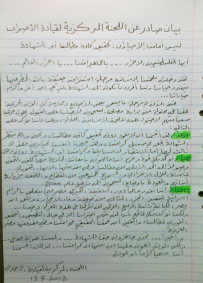Tag: Administrative Detention
-
Concern mounts for three remaining hunger strikers
30 July 2012 | Addameer, Al Haq, PHR-Israel Addameer Prisoner Support and Human Rights Association, Al-Haq and Physicians for Human Rights-Israel (PHR-IL) are gravely concerned for the life and health of the three remaining Palestinian hunger strikers held by Israel. Of utmost concern is the health and life of administrative detainees Samer Al-Barq, today on…
-
What Thaer Halahleh’s family told me about his release brings joy, but raises troubling questions
by Lina Al Saafin 15 May 2012 | Electronic Intifada At around 1:30am Palestine local time I was lying on my side in my bed trying to sleep and doing my best to ignore the queasy feeling in the pit of my stomach as I thought about how the 64th commemoration of Nakba Day would…
-
Statement No. 7 of the Strike leadership
by The Central Committee of the Leadership of the Strike 13 May 2012 | Samidoun We have only two options: to achieve all of our demands, or to die Free Palestinian people, masses of our nation, free people of the world…. We have entered a stage of legendary and draining human struggle, where we face…

